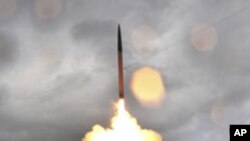A senior Pentagon official says a U.S. missile defense called Terminal High-Altitude Area Defense (THAAD) is a key part of efforts to counter North Korean missile threats.
David Stilwell, the Pentagon’s deputy director for Politico-Military Affairs for Asia, Joint Staff, said North Korean missiles “create demand for missile defense” and the THAAD system provides “greater security” for South Korea specifically.
Stilwell made his comments at a speech in Washington Friday.
The comments came amid an ongoing controversy over the possible deployment of the missile defense system in South Korea.
China’s assistant minister of foreign affairs, Liu Jianchao, expressed concern last week about the idea during his visit to Seoul. That drew criticism from South Korea’s Defense Ministry, which said a “neighboring country” should not try to exercise “influence” on its security policies, in an apparent reference to China.
Washington is playing down the controversy. Stilwell said the North Korean nuclear issue is a topic that the U.S. and China "discuss at length."
"Obviously, it’s important because both sides stand to suffer from any sort of nuclear accident or the loss of control of those nuclear capabilities," the Air Force brigadier general said.
Pentagon officials say the truck-mounted THAAD system would give South Korea enhanced deterrence against North Korea’s increasing missile and nuclear threats. However, U.S. and South Korean military officials have said no decision has been made on the defense system’s deployment.
Kim Min-seok, spokesman for South Korea’s Defense Ministry, told reporters Monday, "We have not decided to deploy the THAAD system in U.S. forces in South Korea, nor have we received any request for a consultation on the matter from the U.S."
The THAAD system, which is equipped with radar capable of tracking objects 1,200 miles away, is designed to intercept ballistic missiles at high altitude.
Jee Abbey Lee contributed to this report, which was produced in collaboration with the VOA Korean service.




